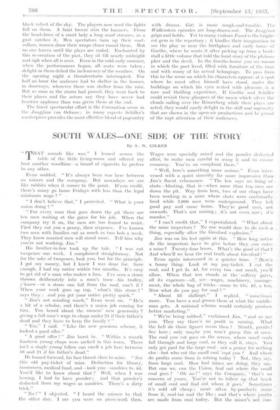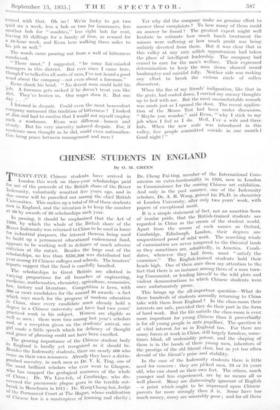SOUTH WALES ONE SIDE OF THE STORY
By A. N.
GILKES
THAT sounds like war." I leaned across the table of the little living-room and offered my host another woodbine—a brand of cigarette he prefers to any other.
Evan nodded. " It's always been war here between its miners and the company. But nowadays we are like rabbits when it comes to the point. D'you credit, there's many go home Fridays with less than the legal minimum wage ? " - " I don't believe that," I protested. " What is your union doing ? "
" For every man that goes down the pit there are ten men waiting at the gates for his job. When the company try it on, the men are too feared to resist. First they cut you a penny, then sixpence. I've known two men with families cut as much as two bob a week. They know married men will stand more. Tell him why you're not working, Jim."
His brother-in-law took up the talc. " I was cut twopence one week. I complained straightaway. Not for the sake of twopence, look you, but for the principle. I got my money, but I knew I was done for. Sure enough, I had my notice within two months. It's easy to get rid of a man who makes a fuss. I've seen a stone thrown deliberately into a man's trow—his trolley, y'know—or a stone can fall from the roof, can't it ? When your work goes up top, ' what's this stone ? ' says they : and you get your notice pretty quick."
" Jim's not minding much," Evan went on. " He's a bit of a scholar, and there's a union job coming for him. You heard about the owners' new generosity ? giving a full man's wage to chaps under ell if their father's dead and they have to keep the faMily ? "
" Yes," I said. " Like the new pensions scheme, it looked a good offer."
" A good offer ! " Jim burst in. " Within a month fourteen young chaps were sacked in this town. There isn't a single young fellow can smell a job here between 18 and 21 if his father's dead."
He leaned forward, his face thrust close to mine. " Sec this old pay-ticket of mine. Deduction , for 'library, insurances, medical fund, and—look you—sundries is. 4d. You'd like to know about that ? Well, when I was hewing, I had to have powder ; and that powder'S deducted from my wages' as sundries. There's a dirty trick."
" No " I objected. " I heard the answer to that the other day. I see you were on piece.:wark then. Wages were specially raised and the powder deducted after, to make meri careful in using it and to ensure economy. You've no complaint there."
" Well, here's something more serious." Evan inter- vened with a quiet sincerity far more impressive than Jim's fluent vehemence. " The law says no firing (4'4 shots—blasting, that is—when more than tell. 111(.11 arc down the pit. Way from here, two of our. chaps have been working in a mine where shots were, continually, fired while 2,000 men were underground. They left good pay and came home. They're good Alien; not. cowards. That's not mining.; it's not even„war ; it's murder."
" I can't credit that," I expostulated. " What abont the mine inspectors ? No one would dare to (11: stick thing, especially after the Gresford explosion.," Jim was on his feet again at this. " How long not ice . do the inspectors have to give before they. (a,n enter,., a mine ? Twenty-four hours. What's the good of that ? And when'll we hear the real truth about Gresford? "
Evan again intervened in a quieter tope– re-;;. a funny thing. Look at my pay-ticket.. I cut the coal, and I get 2s. 4d. for every ton—not much, you'll allow. When that ton stands at the colliery gates, all its expenses—all, see—wages, machinery, manage.; ment, the whole bag of tricks—come to 13s. 4d.. a ton, Now what do you pay for coal ? "
" About 35 shillings," I replied, " somet i nies more. You have a real grouse there at what the middle- man gets. A national scheme would certainly produce better marketing."
" We're.' being robbed," exclaimed Jim. " and so are you. They say there's no profit in mining. Wind; the hell do those figures mean then ? 'Struth„ profits ! See here ; only maybe you won't grasp this at once. The coal you cut goes on the screen, where small coals fall through and large coal, as they call it, stays, : You only get paid for the large coal—not a penny for nothing else—but who cut the small coal 'eept you ? And, where do profits come from in mining today ? Not, they .say, from large coal. How bad mines arc doing, they say. But can we, can the Union; find out where the small coal goes ? Oh no ! says the Company, that's no concern of yours. You're. not, to follow u pthat truck of small coal and find .Out where it :goes.' Sometimes it's sold off 'cheap ; more often by-plod I, cI Is et,m(! from it, coal-tar and the like; and that's where profits arc made from coal today. Ent the miner's not ean- corned with that. Oh no ! We're lucky to get two (laid six a week, less a bob or two for insurances,. less another bob for " sundries," less eight bob for rent, leaving 35 shillings for a family-of four, as reward for 48-hour week, and Evan here walking three miles to his job as well." • The words came, pouring out from a well of bitterness unrelieved.
" There must," I suggested, " be some fair-minded Managers in this district. But ever since I came here, though I've talked to all sorts of men, I've not heard a good word about the company—not even about a foreman." Evan shook his head. " No decent man could hold his job. A foreman gets sacked if he doesn't treat you like dirt. They've beaten us. Our wages show it. But one day- I listened in despair. Could even the most benevolent company surmount this tradition of bitterness ? I looked at Jim and had to confess that I would not myself employ such a workman. Evan was different—honest and steady. But his very sincerity induced despair. For, if moderate men thought as he did, could even nationalisa- tion bring peace between management and men ? Yet why did the company make no genuine effort to answer these complaints -? To how many of them could an answer be found ? The greatest expert might well hesitate to estimate how much harsh treatment the miners were suffering or how much profit was being unfairly diverted from them. But it was clear that in this valley at any rate selfish opportunism had taken the place of intelligent leadership. The company had ceased to care for the men's welfare. Their expressed determination to keep the men down showed moral bankruptcy and suicidal folly. Neither side was making any effort to break the vicious circle of sullen discontent.
When the fire of my friends' indignation, like that in the grate, had cooled down, I carried my uneasy thoughts up to bed with me. But the most uncomfortable remark was made just as I opened the door. The recent applica- tion of the Means Test 'had been under discussion. " Maybe you wonder," said Evan, " why I stick to my job when I feel as I do. Well, I've a wife and three kids. When the new scale was introduced in this valley, five people committed suicide in one month 1 Good night ! "







































 Previous page
Previous page